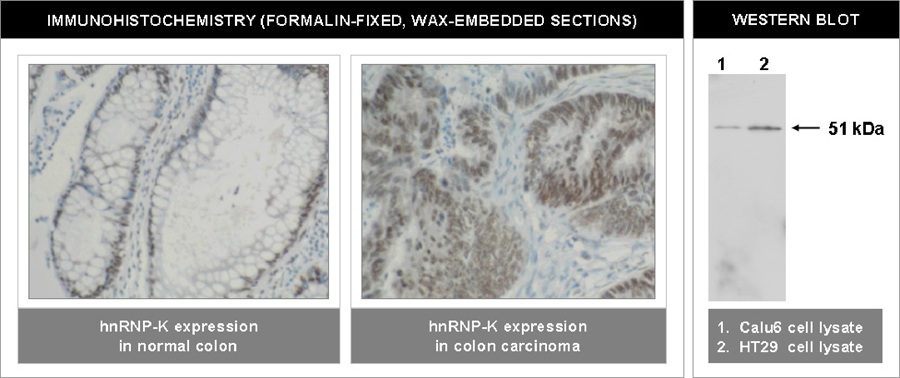
Mouse anti Human Heterogeneous Nuclear Ribonucleoprotein K
Catalog number: X2068M$335.00
Add To Cart| Clone | F45 P9 C7 |
| Isotype | IgG1 |
| Product Type |
Monoclonal Antibody |
| Units | 200 µg |
| Host | Mouse |
| Species Reactivity |
Chicken Human Mouse Rabbit Rat |
| Application |
Immunohistochemistry Western Blotting |
Background
Heterogeneous nuclear ribonucleoproteins (hnRNPs) constitute a set of polypeptides that contribute to mRNA transcription and pre-mRNA processing as well as mature mRNA transport to the cytoplasm and translation. They also bind heterogeneous nuclear RNA (hnRNA), which are the transcripts produced by RNA Polymerase II. There are approximately 20 known hnRNP proteins, which range in size from 34 kDa to 120 kDa, and their complexes are the major constituents of the spliceosome. The majority of hnRNP proteins components are localized to the nucleus; however some shuttle between the nucleus and the cytoplasm, such as hnRNP K. hnRNP K, a 65 kDa protein, recruits a variety of molecular partners through two K homologous (KH) domains, which are required for protein-protein interactions. hnRNP K also contains several potential phosphorylation sites, including Ser 302, the major site of PKCd phosphorylation, which are thought to regulate various cellular functions, including sequence-specific DNA binding, transcription, RNA binding and nucleocytoplasmic shuttling.
Synonyms: hnRNP-K; CSBP; TUNP; dC-Stretch Binding Protein
Source
Immunogen: Hybridoma produced by the fusion of splenocytes from BALB/c mice immunized with a synthetic peptide derived from the C-terminal of the hnRNP-K protein and mouse myeloma Ag8563 cells. Sequence common in human, mouse, rat, rabbit and chicken
Product
Product Form: Unconjugated
Formulation: Provided as solution in phosphate buffered saline with 0.08% sodium azide
Purification Method: Protein A/G Chromatography
Concentration: See vial for concentration
Applications
Antibody can be used for Western blotting (1-2 µg/ml) and immunohistochemistry on formalin-fixed, paraffin-embedded tissues (1-5 µg/ml). Optimal concentration should be evaluated by serial dilutions.
Functional Analysis: Western Blotting
Positive Control: Colorectal cancer tissue, Calu6 and HT29 cell lysates
Storage
Product should be stored at -20°C. Aliquot to avoid freeze/thaw cycles
Product Stability: See expiration date on vial
Shipping Conditions: Ship at ambient temperature, freeze upon arrival
Caution
This product is intended FOR RESEARCH USE ONLY, and FOR TESTS IN VITRO, not for use in diagnostic or therapeutic procedures involving humans or animals. It may contain hazardous ingredients. Please refer to the Safety Data Sheets (SDS) for additional information and proper handling procedures. Dispose product remainders according to local regulations.This datasheet is as accurate as reasonably achievable, but our company accepts no liability for any inaccuracies or omissions in this information.
References
1. Wei, C.C., et al. (2006). Heterogeneous nuclear ribonucleoprotein K modulates angiotensinogen gene expression in kidney cells. J. Biol. Chem. 281(35):25344-25355
2. Dzwonek, A., et al. (2006). The diverse involvement of heterogeneous nuclear ribonucleoprotein K in mitochondrial response to insulin. FEBS Lett. 580(7):1839-1845
3. Carpenter, B., et al. (2006). Heterogeneous nuclear ribonucleoprotein K is over expressed, aberrantly localised and is associated with poor prognosis in colorectal cancer. Br. J. Cancer. 95(7):921-927
Protein Reference(s)
Database Name: UniProt
Accession Number: P61978
Species Accession: Human
Safety Datasheet(s) for this product:
| EA_Sodium Azide |

"Left and Center: Immunohistochemical staining of normal colon (left) and colon carninoma (center) using hnRNP-K antibody (Cat. No. X2068M). Right: Western blot using hnRNP-K antibody on Calu6 (1) and HT29 (2) cell lysates."
